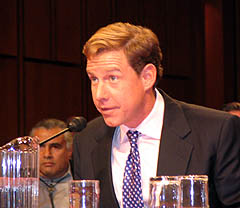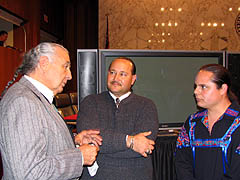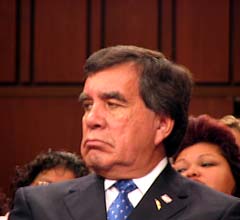LOBBYING SCANDAL

Public relations consultant Michael Scanlon
refused to answer questions at November 17, 2004,
Senate Indian Affairs Committee hearing.
� Plea Deal | Attachment |
US
v. Scanlon

Retired Sen. Ben Nighthorse Campbell (R-Colorado)
with Albert Alvidrez and Carlos Hisa (r) of the Tigua Tribe of Texas after
November hearing.

Richard Milanovich, chairman of Agua Caliente Band of Cahuilla Indians,
at September 29, 2004, hearing.
|
New information in the Jack Abramoff lobbying scandal was presented by the Department of Justice on Monday involving at least two members of Congress
and a California tribe.
An agreement signed by Michael Scanlon, who pleaded guilty to conspiracy to violate bribery and mail fraud laws, details a scheme involving "Representative #1,' who has been identified as Rep. Bob Ney (R-Ohio). According to the deal, Scanlon offered "things of value" to Ney in exchange for Ney's support on legislative and other matters.
Ney has repeatedly denied any wrongdoing and has said Scanlon and Abramoff "duped" him into sponsoring a rider to help the Tigua Tribe of Texas reopen its casino. The Tigua Tribe gave $4.1 million to Scanlon, a portion of which was split with Abramoff in an illegal scheme, according to federal prosecutors.
Beyond Ney, the agreement indicates second lawmaker -- described only as "a member of another committee of the House of Representatives" -- was linked to the Tigua scheme. According to prosecutors, Ney agreed to seek the support of this public official in December 2002, four months after he told Tigua leaders that the casino effort was still in progress.
The document doesn't indicate whether the second lawmaker did anything in regard to the matter
or whether the second lawmaker met with the tribe. No legislation was introduced that year regarding the Tigua casino, according to a search on Thomas, the Congressional database.
Tigua representatives testified before the Senate Indian Affairs Committee last November. They said they were lied to by Scanlon and Abramoff.
"A rattlesnake will warn you before it strikes," said Carlos Hisa, the tribe's lieutenant governor at
the November 17, 2004, hearing during which Scanlon refused to testify. "They did everything behind our backs."
Three months earlier, Richard Milanovich, the chairman of the Agua Caliente Band of Cahuilla Indians in California, told the committee that he was angry at Scanlon and Abramoff but didn't want the tribe labeled as a "victim." "We have been hurt dramatically," he said.
Milanovich opposed working with Scanlon and Abramoff but was overruled by their allies on the tribal council. Monday's agreement indicated the tribe may have had more involvement than previously reported.
According to the document, Ney met with "California tribe" to discuss his support of "legislation regarding taxation of certain payments received by members of the tribe, and to assist in an issue relating to a post office of interest to the California tribe."
The meeting occurred sometime in 2002 -- the agreement doesn't say when -- but that was about the time the Agua Caliente Band was interested in reacquiring land that was being used by the U.S. Postal Service for a post office in downtown Palm Springs. The tribe was leasing the land to the government but wanted the post office moved.
According to a Senate record from 2002, the tribe hired Abramoff's firm that year to lobby on "Postal" issues, among other matters [
Registration
Form].
A spokesperson for the tribe declined to confirm any details or talk about the tribe's involvement yesterday. "We are not commenting on this matter since it is still under investigation," said Lydia Kremer, the tribe's communications consultant.
The inclusion of the details in the plea agreement shows Scanlon will tell federal investigators
about these and other matters. He has been cooperating for the past six months, his lawyers said
yesterday.


